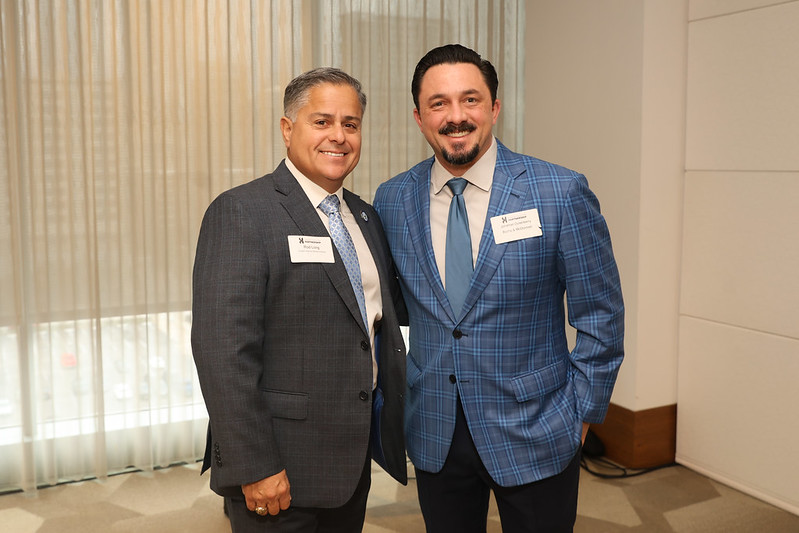Preparing Your Workplace for Returning Employees
Published Jun 05, 2020 by Kelsey Seeker
As many Houston employees begin returning to the workplace, legal experts say employers will need to consider the potential issues that could arise and how to address them.
Steve Shardonofsky, Partner, Seyfarth Shaw LLP, recently spoke at a webinar hosted by the Partnership’s Talent Resources Group on June 4. Shardonofsky walked attendees through compliance tips for employers to consider, potential legal risks to prepare for and which employment laws are most applicable in the COVID landscape.
Shardonofsky stressed these were best practices intended for general information purposes only and not intended to be legal advice. He encouraged employers to meet with their attorneys to discuss specifics.
Review Best Practices for Recalling Furloughed Employees
Shardonofsky urged employers to consider risks of discrimination when recalling furloughed employees. He said it’s best to create criteria that’s consistent, whether it’s based on critical functions, location, or business needs, and to document the process before making decisions.
“I get questions like why can’t I exclude employees 65+ since I don’t want to force them to return to work? While that may be well-intentioned, you need to include them in the pool to return and then discuss if they need accommodations,” Shardonofsky said.
He added employers cannot avoid rehiring employees based on age or medical conditions without violating the law.
After employers have made their selections, they should discuss concerns and accommodations with those workers, such as telecommuting needs or delaying a return to the office.
While documentation may not be necessary for recalled employees, this may present an opportunity to update relevant documents or get necessary signatures. Shardonofsky recommended sending a recall letter or notice, detailing the position, pay rate, schedule and the date the employee is expected to report back or a date they must respond by.
“Some employees may be nervous and unsettled about coming back to work,” Shardonofsky explained. “Take this opportunity to reassure employees by describing new safety precautions and protocols you are taking to ensure their safety. Give them the chance to reach out privately with any questions or concerns.”
Implement Safety Protocols to Mitigate Liability for COVID-19 Exposure at Work
Shardonofsky said complying with CDC, OSHA and other safety protocols does three things:
- Keeps workers, their families, and communities safe.
- Encourages workers and customers to return.
- Follows the law. Employers must provide a workplace free from recognized hazards likely to cause death or serious physical harm.
“By implementing safety protocols, employers have a likely defense in case of negligence claims and that applies to customers, third party and reduce workers compensation,” Shardonofsky said. “It’s too early to tell if workers' compensation will apply for COVID-19 exposure, but you need to check with your insurance carrier and watch out for legislation limiting employer liability.”
Shardonofsky explained pre-injury or illness liability waivers are not a good idea, and while maybe enforceable with non-employees (like independent contractors or customers), they can be awkward, off-putting and lead to other issues.
He said the best practice is to implement, documents, enforce and have employees acknowledge receiving any new COVID-19 health and safety policies, protocols and training.
“Encourage workers [who are] at a higher risk to self-identify and discuss possible accommodations for high-risk workers,” Shardonofsky said. “Accommodations could include supporting teleworking or temporary leaves of absence, offering duties to minimize contact with customers or other employees, temporary job restructuring or changes to work schedule.”
Shardonofsky recommended assessing the appropriate PPE needed for the workplace according to industry standards. He also suggested implementing the appropriate administrative controls, such as staggered shifts, limited in-person interactions and one-way aisles. There are also engineering controls to consider, such as erecting physical barriers, closing breakrooms and using signage to reinforce safety protocols.
“I would refer back to the Texas Department of Health State Services checklists and CDC Guidelines for specific protocols for your workspace,” Shardonofsky shared. “The Partnership has also collected many safety protocol guidance documents, templates and samples for a variety of industries.”
Conduct COVID-19 Health Screenings at Work
The CDC suggests “conducting routine, daily checks (e.g. temperature and symptoms screening) of all employees” and lists approved questionnaires, temperature checks and testing. Shardonofsky said employers should determine procedural questions, like how and where to screen, protocols for documentation and internal reporting, privacy and confidentiality requirements and more.
“Create screening protocols, but first provide workers notice before implementing anything,” Shardonofsky suggested. “You need to tell [employees] how and what they will be screened for, and how that information will be used.”
Shardonofsky noted that many of his firm’s clients are using simple questionnaires. Employees are asked to answer three or four questions that can quickly cover if they’ve tested positive, been exposed to the virus or recently traveled.
He also noted that temperature tests are becoming more common, but because some employees may be asymptomatic, Shardonofsky encouraged employers to implement other precautions in addition to temperature checks, such as testing or questionnaires.
“If your employees work in a dense space, you will probably need to test more than others,” Shardonofsky said. “Make sure to use tests that actually approved by the FDA and CDC. The EEOC has not spoken directly on antibody tests but consider holding off until CDC or EEOC has provided more guidance.”
Develop a Process to Manage Confirmed or Suspected COVID-19 Cases
Shardonosky said employers should have a plan in place to identify, isolate and send employees home who are may be affected. He also advised businesses to encourage the employee to self-quarantine and contact their health provider while closing off the area the employee has been in and wait 24 hours to clean and disinfect the space.
Shardonofsky said the next crucial step is contract tracing and figuring out who might have been exposed. Inform co-workers and third parties of possible exposure and do so without revealing the identity of the affected employee.
“Think about talking with your attorney’s about informing local or state health departments about the potential exposure in the workplace,” Shardonofsky said. “Together determine if noticed is necessary to your workers’ compensation insurance carrier or report on OSHA log.”
He also advised employers to develop criteria so that both the employer and employee know when it is safe for that employee to return to work. The CDC guidelines recommend different options for employers when developing criteria but stress asking the employee for particular documentation may be difficult during this time.
Research Risks of Changing Wages & Hours
Shardonofsky noted employers should be conscious of potential wage violations. He gives a couple of examples:
Exempt employees are not entitled to overtime but must be paid on a salary basis, which means the same amount each week without regard to the number of hours worked or the quantity of work. If these exempt employees are furloughed but they are doing any work during this time, including answering emails or texts, that may be a salary basis violation.
When exempt employees come back to work, a dilution of their work duties may occur. In order to be considered exempt, employees must perform certain duties. If other employees are still furloughed or have reduced hours, exempt managers may have to take on non-exempt duties and are then at risk of losing their exemption.
 The Houston Report
The Houston Report




















